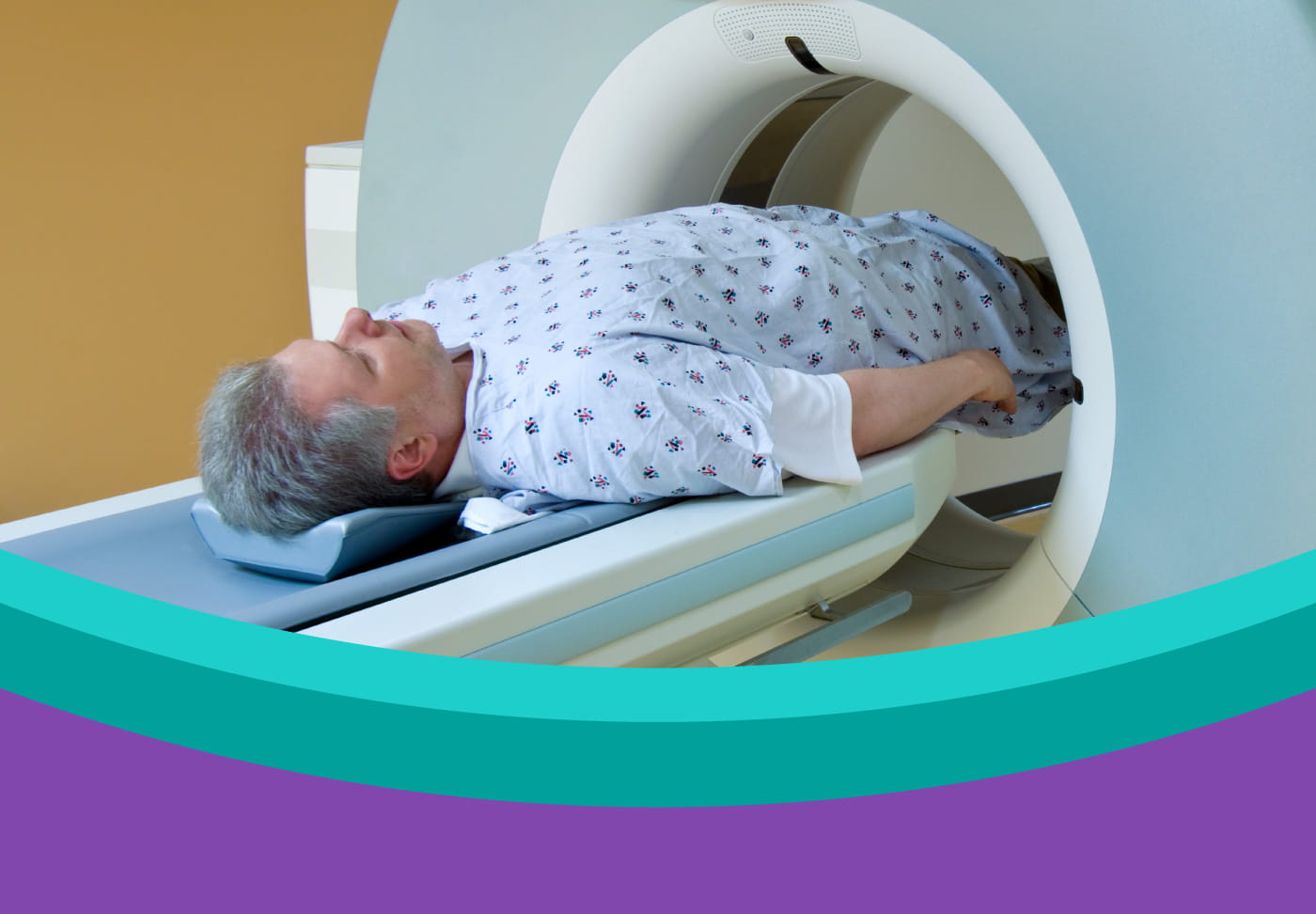
Prostate Cancer
Care personalized for you
How you choose to treat your prostate cancer is a very personal decision. We’re here to help you understand your individual level of risk and your choices.
Prostate Cancer Care That’s Right for You
Multidisciplinary care
Across Wellstar, urologists, radiation oncologists, medical oncologists, radiologists and pathologists collaborate on the best way to treat patients. We also have a prostate cancer-specific tumor board to review more complex cases as a team.Men and their partners can meet with a multidisciplinary team of prostate cancer experts and a nurse navigator for the most comprehensive and personalized care. Since surgery and radiation are often treatment options for prostate cancer, it can difficult to decide which is the best option. We provide the opportunity for patients to meet with a radiation oncologist and surgeon with their nurse navigator and leave feeling confident that they've made the right treatment decision.
Personalized care, from active surveillance to leading technology
Most of our patients with low-grade, early-stage prostate cancer choose to monitor their prostate cancer with their physician following an active surveillance protocol. Other patients benefit from state-of-the-art prostate cancer treatment including same-day robotic prostatectomy, leading-edge radiation therapies and genetic testing. We also offer chemotherapy, hormone therapy and clinical trials that offer promising treatment.Patient satisfaction
Our program is backed by high patient satisfaction scores that recognize the expertise of our urologists, radiation oncologists and medical oncologists as well as an excellent network of support led by nurse navigators.Nationally accredited program
The American College of Surgeons (ACS) Commission on Cancer (CoC) recognizes Wellstar Health System as achieving Cancer Program Accreditation. To earn this voluntary CoC accreditation, our Integrated Network of Cancer Programs (INCP) demonstrates excellence in the delivery of comprehensive patient-centric care and met 100 percent of the 24 CoC quality care standards. The CoC recognized Wellstar as the first Network Cancer Program in Georgia and the fifth in the nation.

Wellstar Vinings Health Park Imaging and Wellstar East Cobb Health Park Imaging are designated American College of Radiology Prostate Cancer MRI Centers by the ACR Committee on Magnetic Resonance Imaging Accreditation and the ACR Commission on Quality and Safety. This designation identifies these centers as top quality providers of safe, effective diagnostic imaging for individuals at risk for prostate cancer.

Who Should be Screened for Prostate Cancer—and When
Screening at regular intervals can help identify whether an individual has prostate cancer, and if it may cause harm if left untreated. Men who identify their prostate cancer early can have the best outcomes, which is an important reason to consider screening on a regular basis.All men can be screened for prostate cancer depending on their individual risk factors. The time when you may benefit from screening varies by age. A prostate-specific antigen (PSA) blood test is the most common way for men to screen for prostate cancer on a regular basis. To get screened, schedule an appointment with your primary care physician or urologist.
The Wellstar Prostate Health Program evaluates people with a higher risk for prostate cancer, offering a personalized approach and multidisciplinary care.
Screening guidelines
According to the American Cancer Society, the decision to undergo periodic prostate-specific antigen (PSA)-based screening for prostate cancer should be an individual one. Before deciding whether to be screened, men aged 50 to 69 years should have an opportunity to discuss the potential benefits and harms of screening with their clinician and to incorporate their values and preferences into the decision.Men at higher risk for prostate cancer may need to start their screening in their 40s.
In recent years, the voice against screening rose because men were overtreated, and active surveillance programs were not readily available. Our team recommends men be screened at regular intervals because we offer the appropriate treatment matched with each person’s level of risk.
Black men are at a higher risk
While the reasons for this disparity are still being researched, it is known that Black men are at a higher risk of developing aggressive prostate cancer and dying from it than men of any other race. According to a recent study, Black men have nearly twice the risk of dying from prostate cancer than white men. This is an important reason for Black men to proactively discuss screening for prostate cancer with their physician.Other risk factors
When a man has a genetic makeup or a family history of prostate cancer that puts him at a higher risk for aggressive cancer, he may benefit from starting screening earlier.Why Genetic Testing for Prostate Cancer is Important
Prostate cancer is currently considered to be a complex, multifactorial disease. In addition to environmental factors, your genetic makeup may affect your risk for prostate cancer. One indication that a man may have a genetic mutation that puts him at greater risk for prostate cancer is when his family has higher-than-average occurrences of prostate, breast, ovarian, uterine, colon and pancreatic cancers as well as melanoma.When prostate cancer is caused by a hereditary syndrome, it is more likely to be an aggressive disease. This knowledge could affect treatment options, including the timing and type of treatment, as well as a more vigilant approach to screening.
Additionally, family members of men with a positive test result can undergo genetic testing to determine if they too are at an increased risk for cancer. At-risk relatives are often offered more aggressive cancer screening at younger ages.
Who should be tested
Those who should consider genetic testing for hereditary prostate cancer syndromes include:- Those with a family history of prostate, breast, ovarian, uterine, colon, pancreatic, melanoma, particularly if early onset (before the age of 50)
- Men with prostate cancer with a Gleason score of seven or higher
- Metastatic or high to very high-risk localized prostate cancer
- Male breast cancer and prostate cancer in the same man
- Family history of breast or ovarian cancer and Ashkenazi Jewish ancestry
- Tumor testing shows mismatch repair deficiency or known variant in a cancer susceptibility gene such as BRCA1 or BRCA2
- Cancer diagnosed at an unusually young age
- Different types of cancer that have occurred independently in the same person
- Cancer that has developed in both organs of a set of paired organs (for example, both kidneys or both breasts)
- Several close blood relatives that have the same type of cancer
- Unusual cases of a specific cancer type (such as breast cancer in a man)
Prostate Cancer Diagnosis
Outward signs and symptoms of prostate cancer are not common. In fact, once a man develops symptoms from prostate cancer, it can be more difficult to cure. Men typically find out they have prostate cancer as a result of a routine screening.PSA blood test
A prostate-specific antigen (PSA) blood test by your primary care provider or urologist is the most common screening test for prostate cancer. When this test reveals a high or elevated PSA, Wellstar physicians will want to learn more about your medical background including your family history, age and other medical issues to determine if further evaluation is necessary.Prostate MRI
The next step at Wellstar is typically to have prostate magnetic resonance imaging, known as a prostate MRI. This specialized type of MRI looks for the cause of the elevated PSA. For example, a man’s PSA may be elevated because of an enlarged prostate. In that case, further testing may not be needed.A prostate MRI offers clearer and more detailed images than traditional methods. Because of the clarity of these images, this technology eliminates the need to have a biopsy for about 30% of patients with an elevated PSA.
PSMA imaging
Wellstar is among the first in Georgia to routinely offer Prostate Specific Membrane Antigens (PSMA) PET scans. This advanced test detects the extent of prostate cancer with greater accuracy and helps doctors plan the best course of treatment. An agent is injected into the body and binds to PSMA, typically found at higher levels where prostate cancer is present. Combined with advanced PET scan technology, high-resolution images of PSMA helps doctors see the presence of prostate cancer earlier, and whether it has spread beyond the prostate.MRI/ultrasound fusion biopsy
When PSA testing and MRI imaging leave a significant concern, a biopsy is needed to determine if a man has prostate cancer. A prostate biopsy guided by MRI and ultrasound technology fused together more accurately diagnoses and stages prostate cancer. During the biopsy, the physician overlays the information from the MRI images onto the ultrasound images in real time to take samples from the areas of concern.
Pathology & personalized medicine
The pathology report will have the results of the biopsy and will determine if a patient has cancer. Each patient typically receives results within 3-5 business days through MyChart, and will meet with his physician to discuss the best course of action.When someone has a high-risk prostate cancer, additional scans help determine if the cancer has spread.
When medically appropriate, prostate cancer tissue undergoes genome sequencing, which examines the cancer’s DNA, mutations and proteins. This information helps our prostate cancer physicians build the best treatment plan, which may include targeted therapies. Targeted therapies match a specific genetic defect with a corresponding, tailor-made drug. This is often referred to as personalized medicine.
The Best Prostate Cancer Treatment for You
We are here to help you understand the unique features of your cancer, discuss your overall health – and make sure you’re aware of every option you have available. Treatments range from following an active surveillance protocol to having leading-edge robotic surgery, radiation therapy or sometimes, chemotherapy, hormone therapy, targeted therapies or other treatments available through clinical trials.Men and their partners can meet with a multidisciplinary team of prostate cancer experts and a nurse navigator so they can get the most comprehensive and personalized care.
Active surveillance for prostate cancer
Many men with low-grade, early-stage prostate cancer choose to follow a treatment plan of active surveillance using a guideline-based protocol with their Wellstar physician. This option helps reduce unnecessary side effects from therapy and improves quality of life. In fact, in recent years, more than 70% of Wellstar patients diagnosed with low-risk prostate cancer opted for active surveillance.With active surveillance, a patient’s urologist monitors him at regular intervals with prostate exams, PSA blood tests and at least one repeat biopsy. At times, it is helpful to use more sophisticated measures such as biomarker testing of the cancer cells and specialized MRI scans.
Most patients on active surveillance do not need to have treatment. However, patients are closely followed so we can offer treatment if the cancer becomes aggressive over time.
Prostate cancer surgery
If prostate cancer has not spread outside of the prostate gland, surgery can be an effective cure. Our urologists have perform radical prostatectomies, or the surgical removal of the prostate. Our surgeons perform high volumes of minimally invasive prostatectomy, including robotic surgery and laparoscopic surgery.Minimally invasive prostatectomies shorten the time spent in a facility following a surgery. These procedures also reduce surgery-site blood loss, scarring and pain, while speeding up recovery. The more precise technology utilized in robotic prostatectomies can help spare nerves and preserve sexual function.
Outpatient prostatectomy or same-day prostatectomy procedures are offered at select Wellstar locations. Wellstar was the first health system in metro Atlanta to offer robotic prostatectomy at an outpatient surgery center.
Radiation for prostate cancer
Wellstar offers a variety of non-invasive, state-of-the-art radiation technologies to treat prostate cancer. Patients have access to brachytherapy, stereotactic body radiosurgery and intensity modulated radiation therapy (IMRT), delivered by advanced systems such as CyberKnife, TrueBeam and TomoTherapy. These technologies allow our physicians to target your cancer and reduce radiation exposure to your healthy tissue:
- Low-dose rate brachytherapy is often used for the successful treatment of prostate cancer. Tiny seeds are implanted directly into the prostate, right next to the cancer, while the patient is under anesthesia. There is no incision, and patients are typically back to normal activities the next day.
- Intensity Modulated Radiation Therapy (IMRT) allows precise delivery of conformal beam radiation treatment.
- Stereotactic body radiotherapy delivers large doses of radiation in a pencil-thin beam from many different angles, thereby allowing completion of treatment in as little as two weeks. Wellstar Kennestone Regional Medical Center and Wellstar North Fulton Medical Center offer CyberKnife stereotactic radiosurgery.
- SpaceOAR Vue Hydrogel technology acts as a spacer, providing separation of the rectum and the prostate for patients undergoing radiation, minimizing the impact on urinary, sexual and bowel function. Wellstar was the first system in Georgia to offer this option to patients for prostate cancer.
Medical oncology for prostate cancer
Medical oncologists and urologic oncologists at Wellstar offer different treatment options for patients with later-stage prostate cancer including chemotherapy, hormone therapy, targeted therapies and clinical trials.- Chemotherapy is typically given intravenously.
- Hormone therapy – also known as androgen suppression therapy – can be given by injections or pills to decrease male hormone levels to slow cancer growth.
- Targeted therapies – Genetic testing and next generation sequencing may give patients with more aggressive variances of prostate cancer insight about genes that can cause prostate cancer. Information about a patient’s genetic makeup can reveal if a targeted therapy will be most effective.
- Radiotherapy injections by nuclear medicine-trained radiologists help reduce pain and extend length of life in men whose prostate cancer has spread to the bone when they do not respond to other treatments.
- Clinical trials give patients with prostate cancer access to novel therapies.
Clinical trials for prostate cancer
Wellstar has a strong track record of participating in promising oncology clinical trials. Many of these studies have resulted in FDA approval of novel immunotherapy or targeted therapies.The Wellstar Research Institute works in collaboration with Northwest Georgia Oncology Centers and Wellstar Urology to offer access to the most advanced treatments for prostate cancer patients. Men with aggressive prostate cancer or recurrent prostate cancer may be eligible to participate in clinical trials.
Support for People with Prostate Cancer
Many men with prostate cancer and their partners appreciate the network of compassionate support that goes beyond medical treatment to improve the quality of their lives.Your cancer support team can include:
- Prostate cancer-specific nurse navigators, who provides a highly personalized level of support and guidance throughout diagnosis, treatment and follow-up care
- Oncology-specific dietitians to help patients feel their best by managing their weight, fighting fatigue, and maximizing the immune system throughout treatment
- Oncology-specific social workers to focus on strategies to empower and improve your quality of life with counseling, education and connection to resources
- Psychologists, psychiatrists and counselors who help patients and family members cope with the emotional side of cancer
- Physical therapists who specialize in pelvic floor rehabilitation to improve bladder, bowel and sexual function
- Men's health specialists, to work with men to treat erectile dysfunction and restore sexual function
Prostate cancer support groups offer men a network of other men to connect with. It can be valuable to have a safe space to talk to someone who understands what you’re going through. Talk to your nurse navigator to get connected.
Learn more about our support services for people with cancer.














